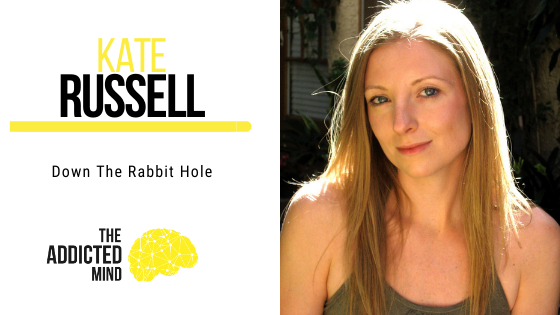Addiction is often the result of pain in our early years of life. Whether it’s passed down through genetics or an attempt to escape the pain, many addicts can point to a hard childhood as the source of their addiction. This is why it’s so important to recognize our family patterns and root out the disease of addiction while we still can.
Today’s guest, Kate Russell, grew up in just such an unhealthy environment. She was physically abused as a child and was raised by an alcoholic mother. However, she now holds amazing compassion as a result of having worked through her trauma and eventual addiction.
Kate is now the author of Down The Rabbit Hole, a memoir of abuse, addiction, and recovery. Getting to read her book, hear her story, and then talk to her on the other side of it all was amazing. Kate inspired me and I think she will do the same for all of you. Tune in to hear all about her book and how she not only endured but grew through her difficult life experiences.
In this episode, you will hear:
- The “God voice” that helped Kate get through the abuse she endured in her childhood.
- The way abuse got so deeply embedded into her that she began to abuse her sister.
- When she first began to see the parallel between her, her mom, and addiction.
- Where the term “rabbit hole” in the title of her book came from.
- How she became addicted to marijuana and alcohol.
- The hole that’s left in our hearts when we heal from an addiction.
- Kate’s journey towards sobriety.
- How recovery looks different than she expected.
- How she has developed such compassion for herself and her parents.
- Why it’s so important to feel all of your feelings and let yourself cry sometimes.
Key Quotes:
[04:38] – “That’s really what the book ended up being about, for me, was the mind… it’s just how our minds work. Not just addicts, but just how the mind works.”
[16:17] – “So ‘Down a Rabbit Hole’ refers to falling down into triggered thinking. So triggered thinking is when we revert back into a helpless childhood, that helplessness we felt in our childhood.”
[20:28] – “The drugs… aren’t very successful at covering up that that deeper level of pain or loneliness or depression or whatever it is. And then you start to realize, ‘Oh, wait, this isn’t quite working anymore.’”
[23:06] – “I was always reaching out for help but wasn’t always met with the results I would have hoped.”
[26:25] – “That’s what I think recovery is. It’s just like slowly unpeeling the onion.”
[28:19] “When I got sober, there’s a pink cloud, if you will call it… life is… different, but everything’s the same. I had the same job, same apartment, same car, but I was sober… everything was new and different.”
[30:01] – “The addictive mind is fear: a fear to change. It’s fear. You are set in your ways.”
[32:28] – “It’s always when you get to the other side, you always look back and go, ‘It wasn’t that bad.’ Or, ‘You know what, it was hard at times. It was. But I got through it. And if I can get through it, so can you.’”
Subscribe and Review
Have you subscribed to our podcast? We’d love for you to subscribe if you haven’t yet.
We’d love it even more if you could drop a review or 5-star rating over on Apple Podcasts. Simply select “Ratings and Reviews” and “Write a Review” then a quick line with your favorite part of the episode. It only takes a second and it helps spread the word about the podcast.
If you really enjoyed this episode, we’ve created a PDF that has all of the key information for you from the episode. Just fill in your information below to download it.

